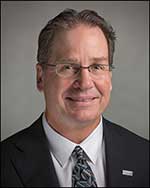Moffitt Lends a Scientific Hand to Pediatric Cancer
While Moffitt Cancer Center rarely treats patients under 18, the cancer center does a lot of work behind the scenes to improve pediatric cancer care through an innovative partnership with the National Pediatric Cancer Foundation, a nonprofit organization dedicated to finding less toxic and more effective treatments for childhood cancer.

Doug Letson, MD, physician-in-chief
The collaboration led to the creation of the Sunshine Project, a research network consisting of more than 20 cancer centers across the United States. Together, the institutions share ideas and fast track treatment options into trials, giving hope to patients and their families.
“The Sunshine Project has streamlined protocol development to allow timely access to personalized care for children with cancer,” said Dr. Doug Letson, physician-in-chief at Moffitt. “Thanks to this phenomenal initiative, promising therapies are available to children who have not had positive results with standard-of-care treatment.”

Damon Reed, MD, Sunshine Project leader in Moffitt’s Department of Interdisciplinary Cancer Management
The project also allows Moffitt to expand its science and mission to young cancer patients across the country. More than 40 young people with cancer each year are enrolled in Sunshine Project trials through Moffitt.
“Moffitt goes beyond our walls to collaborate with others across the country,” said Dr. Damon Reed, an oncologist and Sunshine Project leader in Moffitt’s Department of Interdisciplinary Cancer Management and specialty physician at Johns Hopkins All Children’s Hospital. “There are less trials available for pediatric, adolescent and young adult cancer patients and we want to change that.”
Thanks to the collaboration, Moffitt has, for the first time in its history, opened trials for patients with three of the deadliest pediatric sarcomas.
Osteosarcoma Trial (Now Open)
Single drug immunotherapy has had no effect on osteosarcoma, so this trial combines immunotherapy with a drug that may both increase the immune system’s response and better reveal the tumor to the immune system. The purpose of the trial is to determine if this novel combination is safe and if it can improve survival in patients who have relapsed.
Ewing Sarcoma Trial (Now Open)
Ewing sarcoma is an aggressive tumor that typically presents as a primary bone tumor in children and young adults, and in nearly all cases has one genetic change. This trial targets that change with an agent called Seclidemstat. Because Ewing sarcoma is so rare, drugs typically aren’t available to study in the disease unless they have been tested in other cancers, which can sometimes take decades. Seclidemstat is being given to patients for the first time in this trial and only for Ewing sarcoma patients.
Fusion Positive Rhabdomyosarcoma (Now Open)
Metastatic fusion positive rhabdomyosarcoma (FPRMS) has a very poor prognosis and is generally considered incurable. While the genetic changes that underlie FPRMS have been known since the 1990s, the search for a drug to target it has not been successful. Now, researchers from Moffitt’s Cancer Biology and Evolution Program and Integrated Mathematical Oncology Program are using evolutionary principles to help design better approaches for the disease. The trial will offer patients and their physician the choice between three different treatment options in addition to a standard care option in newly diagnosed FPRMS patients. All three novel options have the shared goal to increase survival to six times higher than the current outcome.



